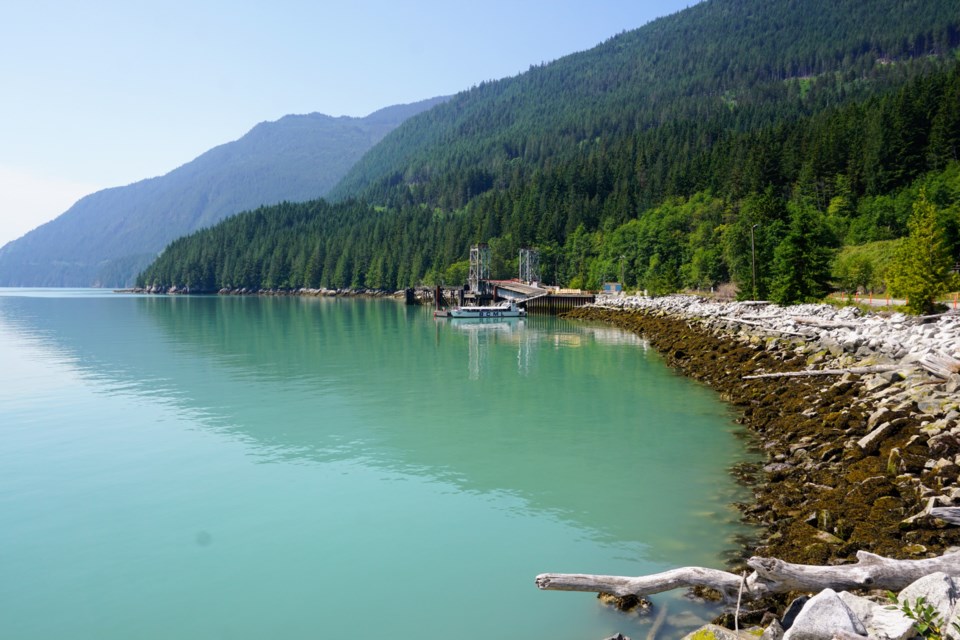Woodfibre LNG (WLNG) is in the early stages of preparing the land for the liquefied natural gas facility.
The future export facility is located seven kilometres southwest of Squamish, on the northwestern shoreline of Átl'ka7tsem Howe Sound.
At a site tour on Wednesday, July 5, several representatives from the company took media members for a short tour around the site. Calvin Stuckert, an environmental and Indigenous affairs specialist with WLNG, pinpointed the location for the incoming floatel, compressor station and floating storage.
Stuckert said when in operation, the facility will produce about 2.1 million tonnes of liquefied natural gas per year.
Towards the north and just passed Mill Creek, Stuckert said the compressor station will be located near the western tree line and pipes will run relatively east towards the floating storage containers.
A slight change from some previous renderings, said Stuckert, is the storage containers will run end-to-end rather than parallel with each other. In total, they will hold about 250,000 cubic metres of liquefied natural gas.
Jayne Czarnocki WLGN’s director of communications, said when in operation, an LNG tanker will come once every 10 days, or about four per month to retrieve the liquefied natural gas from the containers.
Additionally, Stuckert said that the north area would be raised approximately “six to eight metres” to account for sea level rise.
Black fencing surrounding parts of Mill Creek marks an area where restoration work will be done to the creek, according to Stuckert.
Moreover, Stuckert said some construction would “cover intertidal and marine habitat” in the area. As a counter, Stuckert explained WLNG is planning the restoration of about 20,000 square metres of marine habitat.
Inland towards the west, WLNG is currently capping a landfill that was left behind from the former pulp mill. Near this capped landfill is where the Eagle Mountain - Woodfibre Gas pipeline from FortisBC will emerge.
Tunnel boring machines were on site but not yet in use. They will ultimately create a nine-kilometre tunnel from Squamish to Woodfibre LNG under the Skwelwil'em Squamish Estuary and Monmouth Mountain. The project’s FortisBC website notes that it aims to begin tunnelling in 2024.
Towards the south end of the site, the floatel will dock close to the shore and workers can walk to and from the floatel to land. Stuckert approximated that about “600 beds” would be on the floatel.
Czarnocki confirmed the floatel should be operational near the start of 2024. Currently, near the same south end is a temporary dock for boat travel. A different, permanent passenger dock has not been built yet, but the pilings are in place.
The District of Squamish council members were recently given an update about the floatel from WLNG president Christine Kennedy and vice president Selena Basi.
“The workforce that is on the floatel is expected to have very little access to the community and certainly no recreational access,” Kennedy said at a May 23 meeting.
At the time, Kennedy said that workers may come to Squamish for supply purposes or medical emergencies that the floatel was unequipped to handle. Basi added that supply purposes would be only while on duty and transportation would not be for “leisure” or “on an optional basis.”
Additionally, Kennedy said there would be no alcohol allowed on the floatel and policies around drug use, but did not elaborate further about the policies at the time.
Some council members at the meeting believed WLNG lacked full public engagement about its safety plans. Kennedy countered by saying the public will be able to view the plan near the start of construction, which aims for a September start.




